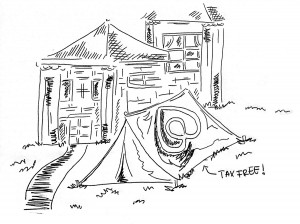POINT: Making an exception for Airbnb has hidden costs
Whether you’re planning a trip over spring break or need a place to crash during your summer travels, Airbnb has proven to be a reliable resource for students. I certainly relied on it when I was traveling during my study abroad semester last spring.
Despite its convenience and affordability for travelers, Airbnb has been known to stir controversy for the impact it has on local housing markets and economies. In fact, a recent study found that the popular housing rental site could be costing the city of Los Angeles up to $41 million each year in potential tax revenue, since the company is not regulated in the same way hotels and other hospitality institutions are.
Given the rising popularity of websites like Airbnb — as well as the potentially negative impacts such rentals can have on the housing markets within the communities they reside — city officials can and should develop a plan to properly tax and regulate home-sharing companies.
Under existing city laws, it is illegal to rent properties for fewer than 30 days at a time in certain areas of Los Angeles. But this hasn’t stopped short-term housing rental websites like Airbnb from flourishing — all while enjoying exemption from regulations such as room taxes and assessment fees that traditional hotels are subject to. And though Airbnb is not considered to be enough like a hotel in order to be regulated like one, a significant number of Airbnb operators have mimicked hotel practices, turning their properties into short and long-term housing without paying anything close to the taxes and fees that are required of traditional hotels. The same study found that approximately 22 percent of Airbnb operators lease their properties for at least 180 days of the year, with 4 percent of operators offering their homes all year round. If a quarter of Airbnb leases are going to operate like a de facto hotel, it only makes sense that they be taxed like one.
This isn’t the first time Airbnb has sparked controversy for failing to pay its fair share of taxes at its residing city’s expense. In Airbnb’s hometown of San Francisco, the company launched a more than $8 million campaign against a city-wide initiative that would limit the home-sharing company from operating private rentals to 75 nights per year and require them to file quarterly reports with the city — seemingly in an attempt to protect the city’s already limited housing market. The company then went one step further by promoting a passive aggressive ad campaign which made reference to the approximately $12 million in hotel taxes it pays to the city each year, implying that the contribution was some sort of philanthropic gift as opposed to a civic obligation. When the ads were met with widespread anger by San Franciscans, the company issued an apology and promised to take the signs down.
Moreover, a study published last month in the Harvard Law and Policy Review found that short-term rentals such as Airbnb are contributing to an issue we’ve discussed previously in this column — Los Angeles’ growing housing crisis. With more and more landlords opting to lease their properties through short-term rental sites like Airbnb, the study concludes that the decrease in available housing for lease further contributes to displacement and gentrification of already housing-poor neighborhoods. By not applying stricter regulations, landlords are thus given the opportunity to make significantly more money on short-term rentals at the expense of their normal tenants. At least that’s what happened to Fairfax natives Carrie Kirshman and Nina Giovannetti last year when they were evicted from their apartments, only to later find them available for lease on Airbnb.
Airbnb came out against the study, blasting it as “inaccurate” and accusing it of attempting to “mislead and manipulate.” And while the home-sharing company is right to note that the study was financed by the American Hotel and Lodging Association — the country’s primary hospitality trade group — that doesn’t necessarily make its findings inaccurate, nor does it dismantle the important conversation that must be had about Airbnb’s effects on local hospitality and rental economies.
Presently, Airbnb enjoys the subtle distinction of not being classified as a hotel — and thus not being taxed like one — while also operating a significant number of rentals that operate exactly like a hotel would. And while Airbnb provides a cheap and reliable service to travelers and tourists, it shouldn’t do so at the expense of the local housing market and the economy. It is in light of this gray area that city officials must develop a plan to regulate and effectively tax short-term rentals.
Yasmeen Serhan is a senior majoring in international relations. “Point/Counterpoint” runs Tuesdays.

